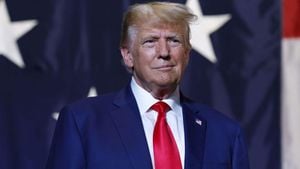Uruguay's political scene underwent significant change with the recent election of Yamandú Orsi, who narrowly captured the presidency under the leftist coalition, the Frente Amplio. Orsi is poised to lead the country back to social welfare policies after the center-right government of Luis Lacalle Pou, and his victory signifies not just a win for his party but also hints at shifting public sentiments surrounding key issues like poverty and security.
Born amid the tendrils of dictatorship, Orsi's political awakening came during the period when Uruguay transitioned back to democracy after military rule stifled dissent for over a decade. His childhood was painted by economic turmoil and the fear instilled by oppressive governance, where suspicion of political activism could lead to persecution. At just 17 years old, he experienced the first free elections of 1984, which sparked his desire to enter politics.
Following years as a high school history teacher, Orsi officially stepped onto the political stage in 2015 when he was elected mayor of Canelones. His campaigning emphasized the Frente Amplio’s historical commitment to social welfare, which resonates deeply with voters concerned about surging crime rates and the rising cost of living. On election night, he secured 49.8% of the votes against Álvaro Delgado's 45.9%, marking the return of the progressive coalition to power after losing to the Nacional Party four years prior.
A significant backdrop to this election was the tight race itself, highlighted by the first round on October 27, 2024, where Orsi received 43.4% of the vote, leaving him short of the 50% majority required to avoid the runoff. Through strategic alliances with other political parties, enough momentum was built to carry him to victory.
The victory, though celebrated within the Frente Amplio, came with new challenges. Voters prioritized crime and safety, issues exacerbated by the rising influence of transnational drug trafficking. For the first time, Uruguay is experiencing one of the highest homicide rates in the region, nearly doubling those of neighboring Chile and the United States. This presents Orsi with the immediate task of healing societal concerns around policing and crime prevention.
Another pressing concern for Orsi's administration will be addressing economic disparities highlighted by the high cost of living, particularly among low-income families, where child poverty stands at 20%. Orsi's plans include reforming pension systems and increasing cash transfers to vulnerable families, demonstrating the Frente Amplio's commitment to holistic social reforms.
Political and social dynamics surrounding Orsi extend to his vice president-elect, Carolina Cosse, who shares his vision but has also drawn attention for her stances on foreign policy concerning contentious regimes. Cosse has previously refrained from labeling Cuba and Venezuela as dictatorships, aligning with inter-Latin American leftist sentiments, which could present future debates on Uruguay's role on the international stage.
Orsi's nuanced views on international relations set him apart from other leftist leaders, particularly concerning Israel. Following his visit to the country, Orsi expressed admiration for its multicultural society and the coexistence among different communities, stating, “On the boulevard, you see people of both faiths. That is what surprises me the most.” His remarks align with his broader belief in dialogue and diplomacy over confrontation, setting the stage for nuanced foreign relations.
Looking forward, the newfound administration will issue challenges not only with domestic issues but also with balancing international relations, particularly as Orsi faces the legacy of the past, including calls for accountability for crimes committed during the dictatorship.
Uruguay is on the precipice of significant change. Yamandú Orsi's leadership might reflect the agitations and aspirations of its populace, signaling their desire for policy reforms and renewed attention to social justice principles, even as he navigates the complex waters of both domestic and foreign politics.



